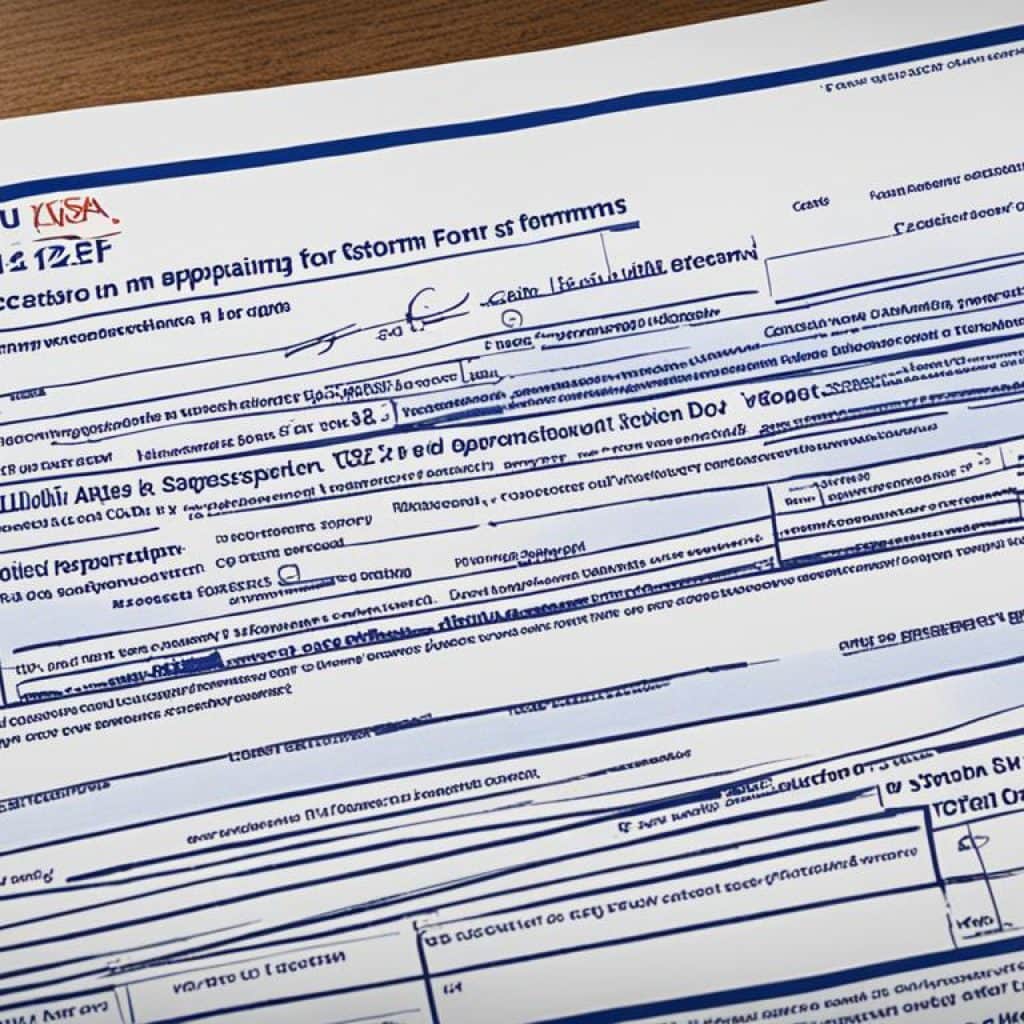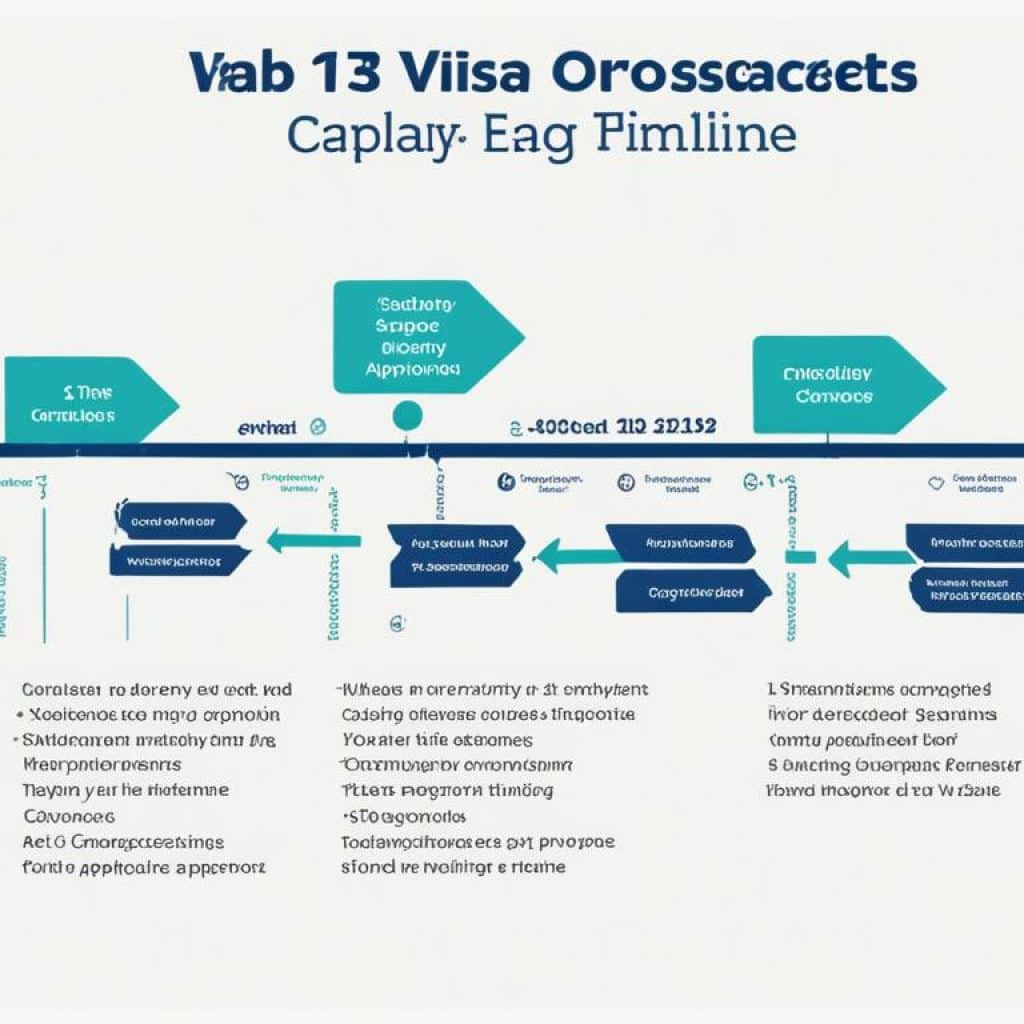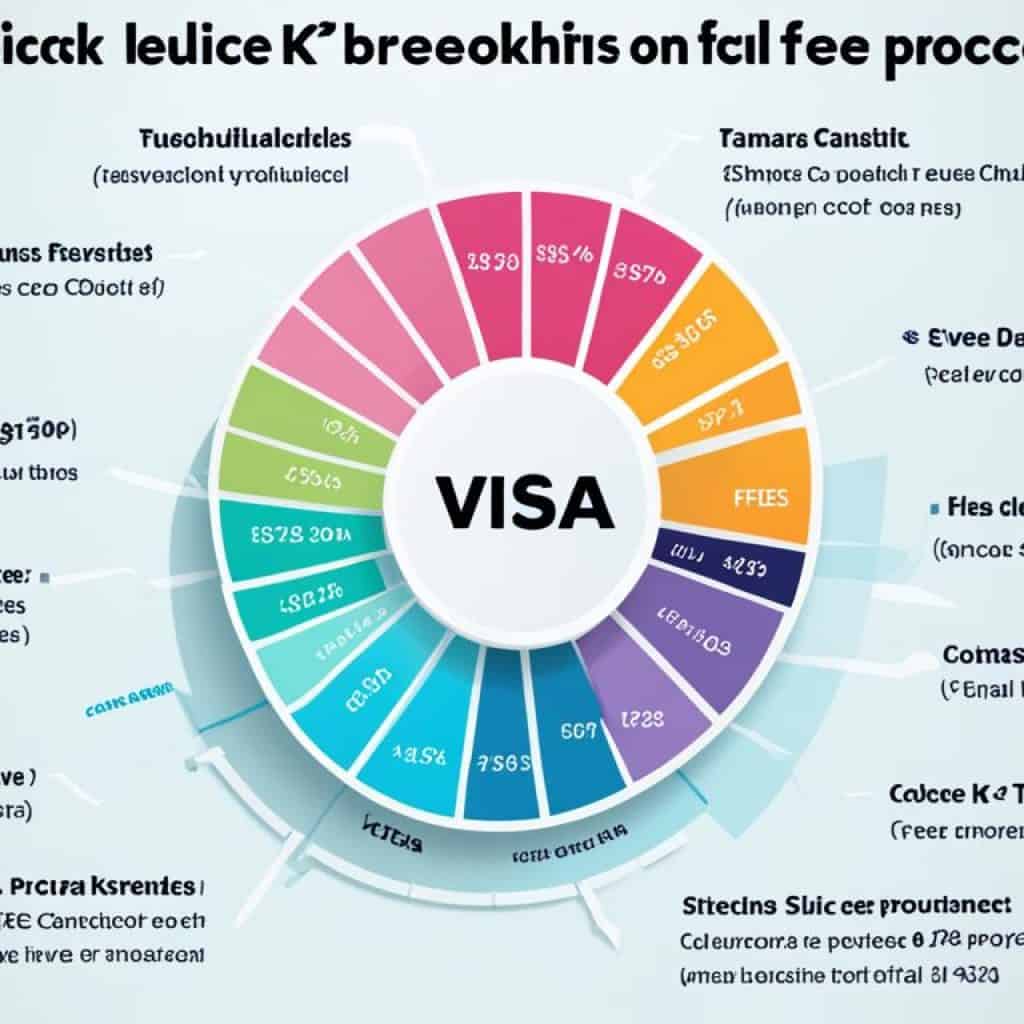Are you and your spouse eagerly waiting to reunite in the United States? The K3 visa might seem like the perfect solution, allowing your spouse to join you while awaiting permanent residency. But is it really worth it?
The K3 visa process can be complex and time-consuming, with a lengthy wait time of approximately 19 months. That’s almost as long as it takes for USCIS to approve the marriage green card application.
Before you decide to embark on the K3 visa journey, it’s essential to understand the ins and outs of the process, including the eligibility requirements, application steps, interview process, fees, and more.
Key Takeaways:
- Learn about the K3 visa process and its benefits for spouses of U.S. citizens.
- Discover the eligibility requirements for a K3 visa and if you qualify.
- Understand the step-by-step application process, including Form I-129F, DS-160, and green card application.
- Explore the challenges and considerations of applying for a K3 visa.
- Consider alternative options and resources for a marriage-based green card.
What is a K-3 Visa?
A K-3 visa is a nonimmigrant visa for spouses of U.S. citizens that allows the foreign spouse to enter and live in the United States while waiting for their immigrant visa petition (Form I-130) to be approved. This visa helps keep families together, allowing the foreign spouse to remain in the U.S. with their spouse during the immigrant visa process.
The Benefits of a K-3 Visa
A K-3 visa offers several benefits for eligible spouses of U.S. citizens:
- Allows the foreign spouse to live in the United States while waiting for the immigrant visa petition to be approved.
- Enables the foreign spouse to work in the U.S. with proper authorization.
- Keeps families together during the immigration process.
“The K-3 visa provides a temporary solution for spouses to live together in the United States while their immigration paperwork is being processed.”
With a K-3 visa, spouses can avoid lengthy separations and navigate the immigration process as a unit. It provides an opportunity for the foreign spouse to establish a life in the United States and contribute to the household income if desired.
The K-3 Visa Process
The K-3 visa process involves several steps:
- Submission of the Form I-129F: The U.S. citizen spouse files the Form I-129F, also known as the “Petition for Alien Fiancé(e)” on behalf of their spouse.
- Correspondence from the U.S. Embassy: Once the Form I-129F is approved, the applicant spouse receives correspondence from the U.S. Embassy in their home country regarding the interview process.
- Interview and DS-160 Application: The applicant spouse attends an interview at the U.S. embassy or consulate in their home country. They also complete the DS-160 visa application online.
- Travel to the U.S. and Green Card Application: After the K-3 visa is approved, the spouse can travel to the United States and apply for a green card using Form I-485.
By following these steps, eligible spouses can navigate the K-3 visa process and reunite with their U.S. citizen spouse in the United States.
| Pros | Cons |
|---|---|
| Allows spouses to live together in the U.S. during the immigration process | Lengthy processing times, almost as long as the marriage green card application |
| Provides work authorization for the foreign spouse | Additional fees and paperwork |
| Keeps families together and avoids long separations | Not always the most efficient option |
K-3 Visa Eligibility
To be eligible for a K-3 visa, you must meet certain requirements. Let’s take a look at the key eligibility criteria:
- Legal Spouse: You must be the legally married spouse of a U.S. citizen.
- Residency: You must currently reside in a country outside of the United States.
- Pending Form I-130: Your U.S. citizen spouse must have already filed a family sponsorship form (Form I-130) with USCIS, and it must be currently pending.
- Income Requirements: Your U.S. citizen spouse must meet certain income requirements to demonstrate the ability to financially support you.
- Children: If you have children, they must be unmarried and under the age of 21.
Meeting these eligibility criteria is essential to proceed with the K-3 visa application process. Make sure to gather all the necessary documents and evidence to demonstrate your eligibility.
| Requirement | Description |
|---|---|
| Legal Spouse | You must be the legally married spouse of a U.S. citizen. |
| Residency | You must currently reside in a country outside of the United States. |
| Pending Form I-130 | Your U.S. citizen spouse must have already filed a family sponsorship form (Form I-130) with USCIS, and it must be currently pending. |
| Income Requirements | Your U.S. citizen spouse must meet certain income requirements to demonstrate the ability to financially support you. |
| Children | If you have children, they must be unmarried and under the age of 21. |
Meeting these eligibility criteria is essential to proceed with the K-3 visa application process. Make sure to gather all the necessary documents and evidence to demonstrate your eligibility.
Step One: Form I-129F
The first step in the K-3 visa process is to complete and submit Form I-129F, also known as the “Petition for Alien Fiancé(e),” to the United States Citizenship and Immigration Services (USCIS). While this form is typically used for fiancé(e)s, it can also be used by spouses of U.S. citizens who seek a K-3 visa.
Form I-129F serves as an official request to USCIS to recognize the relationship between the U.S. citizen spouse and the foreign spouse. It requires detailed information about both individuals, including biographical information, evidence of the marital relationship, and proof of eligibility for the K-3 visa.
When completing and filing Form I-129F, it is crucial to include essential supporting documents to strengthen the petition. These documents may include:
- Proof of U.S. Citizenship: Provide a copy of the U.S. citizen spouse’s birth certificate, certificate of naturalization, or passport.
- Marriage Certificate: Include a certified copy of the marriage certificate as evidence of the legal marriage between the U.S. citizen and the foreign spouse.
- Receipt Notice for Form I-130: Submit a copy of the receipt notice from USCIS acknowledging the pending Form I-130, which is the immigrant visa petition filed by the U.S. citizen spouse on behalf of the foreign spouse.
- Photographs: Enclose recent photographs of the U.S. citizen and foreign spouse, providing evidence of the legitimacy of the marriage.
By submitting Form I-129F with the necessary supporting documents, the U.S. citizen spouse initiates the K-3 visa petition process, laying the foundation for the foreign spouse to join them in the United States while awaiting the approval of the Form I-130.

Key Points:
– Form I-129F is used to petition for a K-3 visa, allowing spouses of U.S. citizens to enter and live in the U.S. during the immigrant visa process.
– Supporting documents, such as proof of U.S. citizenship, marriage certificate, and Form I-130 receipt notice, should accompany the petition.
Step Two: Form DS-160 and Interview
Once the Form I-129F is filed and approved, the applicant spouse will receive correspondence from the U.S. Embassy in their home country. This correspondence will include the date and time of the applicant spouse’s interview at the U.S. embassy or consulate. The applicant spouse must then electronically file the DS-160 visa application on the Department of State’s website and bring the confirmation page and required documents to the interview.
The DS-160 visa application is a crucial step in the K-3 visa process. It is an online form that collects biographic information, travel details, and background information from the applicant spouse. The form must be completed accurately and truthfully, as any discrepancies or false information may lead to visa denial.
During the DS-160 application process, it is essential to have all the necessary documentation readily available. This includes the applicant spouse’s passport, marriage certificate, evidence of financial support, and any other supporting documents requested by the U.S. embassy or consulate. It’s crucial to review the specific requirements for the interview location to ensure all documents are prepared.
K3 Visa Interview Preparation
The K-3 visa interview is a significant step in the process and plays a crucial role in determining the visa approval. It is essential for the applicant spouse to be well-prepared and confident for the interview. Here are a few key points to consider when preparing for the K-3 visa interview:
- Dress Professionally: It is recommended to dress professionally for the interview to make a good impression.
- Be Punctual: Arrive at the embassy or consulate on time for the scheduled interview.
- Required Documents: Bring all required documents to the interview, including the DS-160 confirmation page, passport, marriage certificate, evidence of financial support, and any other supporting documents requested.
- Practice Interview Questions: It can be helpful to practice common interview questions and prepare answers to ensure a smooth and confident interview.
During the interview, the consular officer will ask questions to verify the authenticity of the relationship and assess the eligibility of the applicant spouse for the K-3 visa. It is essential to answer truthfully and concisely. In some cases, the officer may request additional documents or ask for further clarification.
Remember, the K-3 visa interview is an opportunity to demonstrate the genuineness of the relationship and meet the requirements for the visa. Being well-prepared and providing accurate information can greatly increase the chances of a successful interview and visa approval.
| Required Documents for K-3 Visa Interview: | Additional Documentation: |
|---|---|
|
|
Completing the DS-160 application accurately and preparing for the K-3 visa interview are crucial steps in the process. By following the necessary procedures and providing the required documentation, couples can enhance their chances of a successful K-3 visa approval.
Step Three: Green Card Application
After the K-3 visa is approved, the final step is for the spouse to travel to the United States and apply for a green card. It is an important milestone in the K3 Visa Process that allows the foreign spouse to establish permanent residency in the United States.
When applying for a green card, it is highly recommended to also file for employment authorization and a travel permit. This enables the spouse to work and travel while waiting for the green card application to be processed. The work permit approval typically takes around four months.
The green card application, officially known as Form I-485, must be filed with the United States Citizenship and Immigration Services (USCIS). The application should be based on the pending or approved Form I-130, which is the petition for alien relative filed by the U.S. citizen spouse.
Applying for a green card is a significant step towards obtaining permanent residency in the United States. It grants the foreign spouse the right to live, work, and study in the country on a permanent basis. The green card also serves as proof of lawful permanent residency status.
During the green card application process, the applicant spouse may be required to attend an interview with USCIS. The purpose of the interview is to verify the authenticity of the marriage and assess the eligibility of the spouse for permanent residency. It is crucial to prepare well for the interview by gathering all the necessary documents and rehearsing potential questions.
Upon approval of the green card application, the spouse will receive the green card, allowing them to reside in the United States as a permanent resident. The green card is typically valid for ten years and can be renewed as needed.
K-3 Visa Processing Time
The K-3 visa processing time can be a significant consideration for couples exploring their options for immigration to the United States. It is essential to understand the timeline involved in the K-3 visa process to make an informed decision for your family.
The average processing time for a K-3 visa is about 19 months, which is similar to the processing time for a marriage green card. This means that it can take nearly as long to obtain a K-3 visa as it would to go through the green card process directly.
Due to the lengthy processing times, many individuals find that applying for a K-3 visa is not the most efficient choice. Instead, they opt to go through the green card process directly, as it may offer a more straightforward and streamlined path to permanent residence in the United States.
It is important to consider your specific circumstances, priorities, and goals when deciding between a K-3 visa and the green card process. Consulting with an immigration professional can provide valuable insights and guidance to help you make the best decision for your family’s needs.
Remember, the ultimate goal is to keep your family together and navigate the immigration process as efficiently as possible. By understanding the K-3 visa processing time and exploring alternative options, you can make an informed choice that aligns with your objectives.

Key Points: K-3 Visa Processing Time
- The K-3 visa processing time is about 19 months.
- This timeline is similar to the processing time for a marriage green card.
- Applying for a K-3 visa may not be the most efficient choice for many individuals.
- Exploring alternative options, such as the green card process, may offer a more streamlined path to permanent residence.
- Consider your specific circumstances and consult with an immigration professional to make the best decision for your family.
K-3 Visa Benefits
Obtaining a K-3 visa comes with several benefits that not only keep families together but also provide temporary legal status for the foreign spouse in the United States. Here are the key advantages of the K-3 visa:
- Family Unity: The K-3 visa allows the foreign spouse to enter and remain in the U.S. while waiting for the approval of their immigrant visa petition. This means that families can stay together during the often lengthy immigration process.
- Temporary Living and Working in the U.S.: With a K-3 visa, the foreign spouse has the opportunity to live and work in the U.S. while their immigrant visa application is being processed. This provides a valuable chance to establish a life and pursue employment opportunities during the waiting period.
- Convenient Green Card Application: Once the K-3 visa is approved, the next step is to apply for a green card. Having already entered the U.S. on a K-3 visa, the spouse can conveniently file the green card application and initiate the process of becoming a permanent resident.
These K-3 visa benefits are significant in ensuring that families can remain together and start their lives in the United States even before the permanent residency is granted.
| K-3 Visa Benefits |
|---|
| Family Unity |
| Temporary Living and Working in the U.S. |
| Convenient Green Card Application |
Having the ability to live and work in the U.S. with their U.S. citizen spouse while waiting for the immigrant visa petition approval can significantly ease the immigration process for foreign spouses. The K-3 visa benefits not only strengthen family bonds but also provide the chance to build a life in the U.S. before obtaining permanent residency status.
K-3 Visa Interview
The K-3 visa interview is a crucial part of the application process conducted at the U.S. embassy or consulate in the applicant spouse’s home country. It serves as an opportunity for the embassy officials to evaluate the authenticity of the relationship and determine the eligibility of the applicant for the K-3 visa. The interview generally takes place approximately 4-6 weeks after receiving correspondence from the embassy.
During the K-3 visa interview, it is essential for the applicant spouse to bring along all the required documents. These documents may include proof of the relationship, such as photographs, joint bank statements, or any other evidence that demonstrates a bona fide marriage. Additionally, a valid legal marriage certificate, a valid passport, and a police clearance certificate may also be required. It is crucial to thoroughly review the embassy’s instructions and guidelines to ensure all necessary documents are prepared.
The interview itself typically involves a series of questions designed to assess the authenticity and validity of the marriage. The embassy officials may ask questions about the couple’s relationship history, how they met, their daily routines, and other personal details. It is crucial for the applicant spouse to provide honest and accurate answers to these questions in a confident and composed manner.
Preparing for the K-3 Visa Interview
It is essential for the applicant spouse to thoroughly prepare for the K-3 visa interview to increase the chances of a successful outcome. Here are some tips to help with the preparation:
- Gather Supportive Evidence: Collect and organize all relevant documents that demonstrate the authenticity of the marital relationship. This may include photos, joint financial statements, communication records, and affidavits from family and friends who can vouch for the relationship.
- Research the Process: Familiarize yourself with the K-3 visa application process and interview requirements. Understanding what to expect during the interview will help alleviate anxiety and ensure better preparation.
- Practice Interview Questions: Practice answering potential interview questions with your spouse. This will help you become more comfortable articulating your relationship history and details about your marriage.
- Dress Professionally: Dress appropriately for the interview in a professional and presentable manner. First impressions can leave a lasting impact on the interviewing officer.
- Be on Time: Arrive at the embassy or consulate on time for your scheduled interview. Lateness may negatively affect your interview and create unnecessary complications.
Image:
K-3 Visa Fees
When applying for a K-3 visa, it is important to be aware of the associated fees. The fees required for the K-3 visa process include:
- Filing Fee for Form I-129F: The filing fee for Form I-129F, the petition for alien spouse, is $0. This fee is waived for K-3 visa applicants.
- Visa Filing Fee: There is a visa filing fee of $265 that is typically paid at the interview. It is important to review specific instructions regarding the time and place of payment, as this may vary depending on the applicant’s home country.
By understanding the fees associated with the K-3 visa application, you can properly plan and prepare for the financial obligations involved in the process.

“Being aware of the fees and payment requirements is crucial when applying for a K-3 visa. It ensures that you can fulfill the financial obligations and avoid any delays or complications throughout the application process.” – Immigration Expert
K-3 Visa Approval
Once the K-3 visa is approved, the applicant spouse can look forward to receiving the visa and beginning their journey to the United States. This exciting milestone brings the much-awaited opportunity for the couple to reunite and build their lives together in the U.S.
With the K-3 visa in hand, the spouse can now make plans for travel and preparing for their new life in the United States. It’s important to note that the K-3 visa is typically valid for two years from the date of issuance, providing ample time for the spouse to settle in and adjust to their new surroundings.
Upon arrival in the U.S., the spouse can also apply for employment authorization, which opens up opportunities for them to work and contribute to their household income. This is an exciting prospect as it allows the spouse to actively participate in the economic aspect of their new life together.
The approval of the K-3 visa marks a significant milestone in the immigration process for couples. It signifies that the U.S. government recognizes the validity of their marriage and acknowledges the importance of keeping families together during the immigration journey.
Now, let’s take a closer look at the highlights of the K-3 visa approval:
| Key Points of K-3 Visa Approval |
|---|
| The K-3 visa is granted to the spouse of a U.S. citizen. |
| Visa issuance allows the spouse to travel to the United States. |
| The K-3 visa is typically valid for two years from the date of issuance. |
| The spouse may apply for employment authorization upon arrival in the U.S. |
The approval of the K-3 visa brings hope and excitement to couples who have been eagerly awaiting the opportunity to be together. It signifies the beginning of a new chapter in their lives, filled with possibilities, love, and the shared pursuit of their dreams in the United States.
Additional Information
While the K-3 visa may seem like an appealing option for spouses of U.S. citizens, it is important to consider the drawbacks before proceeding. The lengthy processing times and additional expenses involved make it generally advisable to avoid the K-3 visa and opt for the green card process directly. This is especially true for couples who are already married and have a pending Form I-130.
Applying for a K-3 visa can be a time-consuming process, with an average processing time of approximately 19 months, which is almost equivalent to the processing time for a marriage-based green card. Additionally, there are additional fees involved, such as the visa filing fee of $265, which can add to the financial burden.
Couples who choose to apply for a green card directly can streamline the immigration process and avoid the delays associated with the K-3 visa. By submitting the Form I-130 and proceeding with the green card application, couples can save time and potentially receive their permanent residence sooner.
For more information on marriage-based green cards and alternative immigration options, there are various resources available for further review. It is recommended to consult with an immigration professional who can provide personalized guidance based on individual circumstances.
Marriage-based Green Card Reviews
When navigating the marriage-based green card process, it can be helpful to hear from others who have gone through the same journey. Online reviews and feedback provide valuable insights and perspectives, giving you a glimpse into the experiences of individuals who have successfully obtained a green card through marriage.
“The green card application process was smoother than I expected. Gathering the necessary documents and attending the interview was a bit nerve-wracking, but overall, it was a positive experience. My advice would be to stay organized and follow the instructions provided by USCIS closely.” – Sarah, green card holder
These reviews can help inform your decision-making and provide reassurance as you navigate the marriage-based green card process. Reading about the experiences of others can offer valuable tips, insights, and strategies to help you prepare effectively and ensure a successful outcome.
Benefits of Marriage-based Green Card Reviews
By exploring marriage-based green card reviews, you can gain a better understanding of the common challenges and hurdles that individuals face throughout the application process. Some key benefits of reading these reviews include:
- Gaining insights into the timeline and overall process
- Learning about potential roadblocks and how to overcome them
- Understanding the documentation requirements and best practices
- Discovering tips for a successful interview
Whether it’s navigating the paperwork, attending the interview, or understanding the overall timeline, hearing firsthand experiences can provide valuable guidance and alleviate any concerns or uncertainties you may have.
Make Informed Decisions
When reviewing marriage-based green card experiences, it’s important to consider that each person’s situation is unique. However, these reviews can serve as a valuable resource to help you make informed decisions and prepare effectively for the green card application process.
Remember, while reviews can provide insight and guidance, it’s always advisable to consult with an immigration professional who can provide personalized advice tailored to your specific circumstances.
Conclusion
In conclusion, the K-3 visa process offers a temporary solution for spouses of U.S. citizens who wish to enter and reside in the United States while waiting for their immigrant visa petitions to be approved. However, it is important to consider the drawbacks of this process, including the lengthy processing times and additional expenses involved.
Applying for a K-3 visa can be time-consuming, with an average processing time of around 19 months. This is almost as long as it takes for USCIS to approve the marriage green card application directly. Moreover, there are additional fees associated with the K-3 visa, such as the visa filing fee of $265, which can further add to the financial burden.
As a result, many couples find that going through the green card process directly is a more efficient option. By filing the Form I-130 and pursuing the marriage-based green card application, spouses can avoid the delays and costs associated with the K-3 visa process.
It is important for couples to consider their individual circumstances and consult with an immigration professional to determine the best course of action. With personalized guidance, couples can navigate the immigration process more effectively and achieve their goal of living together in the United States.
FAQ
What is a K-3 Visa?
A K-3 visa is a nonimmigrant visa for spouses of U.S. citizens that allows the foreign spouse to enter and live in the United States while waiting for their immigrant visa petition (Form I-130) to be approved.
What are the eligibility requirements for a K-3 Visa?
To be eligible for a K-3 visa, the applicant must be the legal spouse of a U.S. citizen, currently reside outside of the United States, and have a pending Form I-130 (family sponsorship) with USCIS. The U.S. citizen spouse must also meet certain income requirements, and any children must be unmarried and under the age of 21.
What is the first step in the K-3 visa process?
The first step is for the U.S. citizen spouse to fill out Form I-129F, also known as the “Petition for Alien Fiancé(e),” and file it with USCIS.
What is the next step after Form I-129F is approved?
The next step is for the applicant spouse to receive correspondence from the U.S. Embassy in their home country, which will include the date and time of the interview at the embassy or consulate. The applicant spouse must then electronically file the DS-160 visa application and bring the confirmation page and required documents to the interview.
What is the final step in the K-3 visa process?
The final step is for the spouse to travel to the United States and apply for a green card (Form I-485) based on the pending or approved Form I-130. It is recommended to file for employment authorization and a travel permit along with the green card application.
How long does it take to process a K-3 visa?
The average processing time for a K-3 visa is about 19 months, which is similar to the processing time for a marriage-based green card.
What are the benefits of a K-3 visa?
The main benefit is that it allows the foreign spouse to enter and remain in the U.S. while waiting for the immigrant visa petition to be approved, keeping families together during the immigration process.
Where is the K-3 visa interview conducted?
The interview is conducted at the U.S. embassy or consulate in the applicant spouse’s home country.
What are the fees for a K-3 visa?
The filing fee for Form I-129F is $0, and there is also a visa filing fee of $265, usually paid at the interview.
How can I find reviews and feedback about the K-3 visa process?
There are various online resources where you can find reviews and feedback about the marriage-based green card process, including experiences with the K-3 visa.
Should I apply for a K-3 visa or go through the green card process directly?
Due to the lengthy processing times and additional expenses, many people find that applying for a K-3 visa is not worth it and choose to go through the green card process directly. It is advisable to consider individual circumstances and consult with an immigration professional for personalized advice.
Are there any additional resources available for more information on marriage-based green cards?
Yes, there are additional resources available for further review and information on marriage-based green cards and the immigration process.








Add comment